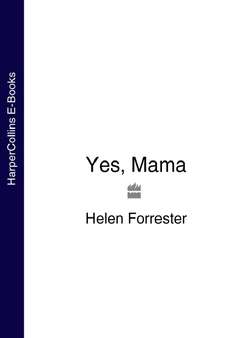Читать книгу Yes, Mama - Helen Forrester - Страница 24
III
ОглавлениеAlicia’s first Boxing Day was a Sunday. Harold and Vera Woodman, accompanied by their three sons, came to spend the day with Elizabeth and Humphrey. At tea time, Alicia was brought down by Polly and laid in her mother’s arms; she behaved admirably and gurgled and smiled at the company.
Aunt Vera stroked the fine down of ash-blonde hair on the child’s head. ‘She’s as fair as a lily – and with such light grey eyes,’ she remarked, watching Elizabeth’s face.
Elizabeth bent her own dark head over the baby and kissed it. ‘My brother is quite fair,’ she lied; at least he was not likely to come home for years; with luck, his black hair would have turned white before he returned to England.
Humphrey chewed his moustache and turned to look out of the lace-draped window. His brother and nephews joined him – babies were not very interesting, particularly when they were girls.
Vera pursed her lips and made no further comment. She brought out from her reticule an ivory ring with two silver bells attached to it. ‘Here, Alicia,’ she said. ‘Here is a pretty present from Father Christmas for you.’
Alicia clutched at the ring, and Elizabeth sighed with relief.
When, the following year, the Queen’s Jubilee was being celebrated in Liverpool, Elizabeth’s sister, Clara, came to stay and to join in the festivities. She was older than Elizabeth and lived in a small house left her by their father, in the village of West Kirby on the Wirral Peninsula. She had been ill with bronchitis at the time of Alicia’s birth and this had left her with a painful cough, making travelling too arduous for her. Thanks to the patient ministrations of her companion-help, she was now feeling better, and had come to see her new niece.
She was a spinster and sometimes quite lonely. When she saw the little girl in Polly’s arms, she said impulsively to Elizabeth, ‘You must bring her to stay with me. The sea air will put some colour into those pale, little cheeks.’
When Elizabeth demurred that the presence of a young child might put too much strain on her delicate health, the older woman replied, ‘Let Polly come as well.’
So Alicia’s early childhood was enlivened by visits to the seaside, occasionally accompanied by Elizabeth, more often by Polly. Though frail and slow-moving, Aunt Clara taught her niece how to build sandcastles and took her to collect shells and to paddle in the shallow pools left by the tide.
Polly had never seen the sea before and was, at first, terrified of its bouncing waves. She soon discovered with Alicia the joys of paddling and she, too, looked forward to these little holidays.
Humphrey had invested money in a railway line to link West Kirby with Liverpool. Because it failed to draw enough passengers and part of it had to run in a tunnel under the Mersey, which was more expensive than expected, he suffered a resounding financial loss. When, finally, it did go through, it was a joyous occasion for Alicia, because dear delicate Aunt Clara could then so easily visit the house in Upper Canning Street. Humphrey was consoled by the fact that a piece of land that he had, years before, bought in West Kirby suddenly became immensely valuable because it lay close to the new station. He sold it for housing development, at a handsome profit.
